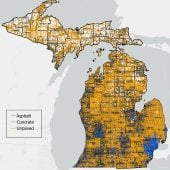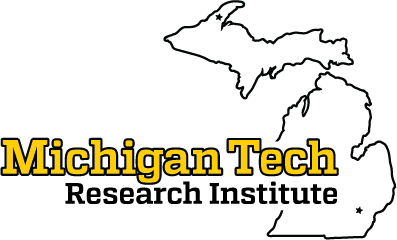Michigan Tech Research Institute actively addresses the needs of government and industry to:
- Understand the impact of new technologies on energy efficiency
- Maximize current technologies to provide greater mobility
- Provide transportation asset managers better inventories of roads and infrastructure
- Develop solutions for troops to better navigate in uncertain terrain
Projects

Model Inventory of Roadway Elements (MIRE) Road Surface Type Identification
This project's goal was the classification of road types across all of Michigan. Machine learning models were used to classify multi-spectral, multi-resolution imagery of Michigan land to pick out and classify roads into unpaved, asphalt, and concrete. The completed road classification data was given to the Department of Transport.

Using Multi-Temporal Imagery to Improve Mapping and Inventory of Forested Roads in Michigan's Upper Peninsula
The purpose of this cooperative project between the US Department of Agriculture Forest Service and the Michigan Tech Research Institute (MTRI) was to develop an updated and improved roads data layer for use in ecological analysis and planning.
Find out more about the project.

Documenting and Determining Distributions, Trends, and Relations in Truck Lanes at International Border Crossing Facilities
The number of truck crossings at the Ambassador Bridge spanning Detroit, Michigan and Windsor, Ontario is greater in volume than the crossings at the Blue Water Bridge, spanning Port Huron, Michigan, and Sarnia, Ontario. Generally, the Ambassador Bridge experienced four to five times more truck traffic traveling into Canada, and three to four times more truck traffic traveling into the United States.
Learn more about the findings.
Tools
Software tools to enable cooperative driving automation research
Michigan Technological University (MTU) partnered with the American Center for Mobility (ACM) at Willow Run to conduct research on energy efficiency of vehicles using connected, autonomous, and electric technologies. Control algorithms designed to improve energy efficiency by researchers from DOE National Labs were used to acquire supporting measurements in real world vehicle tests. Several enabling technologies required development or adaptation for research for these tests. As part of this work, MTU developed a toolkit of network communications modules to encode, decode, and route messages through the infrastructure at ACM to facilitate tests of real vehicles on the track, along with virtual vehicles operating in a digital twin. The collection of network modules, QuickV2X toolkit, allows virtual vehicles to both transmit and receive BSM messages through the appropriate V2X units at ACM.
The researchers developed the Michigan Tech micro-traffic simulator (MiTe-μ), which provides a light-weight tool to generate and visualize virtual vehicles in the digital twin of ACM to participate in mixed-reality tests.
Lean more about the QuickV2X toolkit: https://www.mtu.edu/mtri/research/project-areas/transportation/mobility/quickv2x/
Learn more about MiTe-μ: https://www.mtu.edu/mtri/research/project-areas/transportation/mobility/mitemu/

